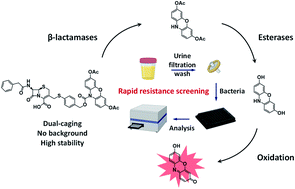A dual-caged resorufin probe for rapid screening of infections resistant to lactam antibiotics†
Abstract
The alarming increase of antimicrobial resistance urges rapid diagnosis and pathogen specific infection management. This work reports a rapid screening assay for pathogenic bacteria resistant to lactam antibiotics. We designed a fluorogenic N-cephalosporin caged 3,7-diesterphenoxazine probe CDA that requires sequential activations to become fluorescent resorufin. A series of studies with recombinant β-lactamases and clinically prevalent pathogens including Escherichia coli, Klebsiella pneumoniae, Enterobacter cloacae and Serratia marcescens demonstrated that CDA possessed superior sensitivity in reporting the activity of β-lactamases including cephalosporinases and carbapenemases. After a simple filtration, lactam-resistant bacteria in urine samples could be detected at 103 colony-forming units per milliliter within 2 hours.



 Please wait while we load your content...
Please wait while we load your content...